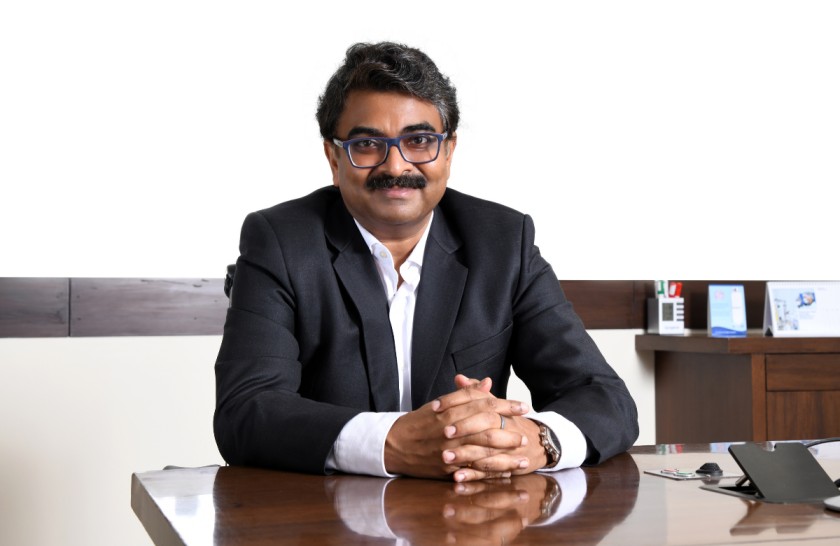- December 22, 2022
How Syngene International’s CFO is balancing current risks with future viability

Mr. Biswas is willing to take a bold step to emerge as a growth driver and transformation enabler.
Today’s business environment is wrought with uncertainty. Soaring inflation, constant rate hikes, a dramatic increase in food prices and cost of living, geopolitical tensions, and a potential recession – all these factors are posing a major challenge in front of business leadership.
Our senior editor, Shivani Srivastava, recently interviewed Syngene International’s CFO Sibaji Biswas who, despite the current economic challenges, is optimistic and willing to take a bold step and emerge as a growth driver and transformation enabler. “With good business momentum, we will continue to invest to capture the business opportunities, and we should be able to fund most of these investments from internal accruals,” believes Mr. Biswas.
Below are the edited excerpts:
Q: Syngene International witnessed good traction this quarter. What are the key drivers that have contributed to this growth? Will this growth be sustainable in the long run?
Sibaji Biswas: We are seeing good growth this year, a 26% year-on-year growth for the second quarter, which is very similar to what we reported in the first quarter. We are seeing this growth across all parts of the business, and it is primarily driven by a higher propensity to outsource bio-pharma related research and manufacturing work. I believe this is also driven by our clients’ interest to de-risk their supply chain, to reduce dependency on one or a few countries. I see India being at a vantage point, and we being an export-oriented organization, are also seeing some benefits. I do expect this growth to sustain and I am optimistic that in the coming years, we’ll witness a strong growth.
Q: What are some of the actions that you’ve initiated related to partnerships and mergers amid uncertain market conditions, yet a buoyant customer demand?
Sibaji Biswas: We are going through a very uncertain, and volatile time across the world. New geopolitical challenges have emerged over the last few years. Our industry is one which is very much dependent on trust and relationships built over a period. For the record, 15 out of the top 20 bio-pharma companies across the world are our customers in some form or the other. We also have a strong evolving relationship with emerging biotech. So these relationships, which have been established over a period of several years are playing out to our advantage at this point of time of uncertainty. So, while I understand there are challenges in the market and we also see some, especially in form of inflationary trends, we have also been in a position to capture the opportunities that are coming down to us as an export-oriented business. We are well placed and our key focus at this point is how to execute well to make this demand traction work for us.
Q: CFOs are operating in a challenging environment where costs have outpaced revenue. What are the cost control strategies that can be utilized to minimize the effects of disruption?
Sibaji Biswas: In a post-pandemic world, we have seen very high inflationary pressure all over the world and India is no exception. The depreciation of the rupee is also impacting expenses, especially related directly or indirectly to oil or energy. We are not immune to the inflationary pressure seen elsewhere in the world
We have tried to keep a close watch on the discretionary expenditures, clearly focusing on the productivity of such spends. We are a company that is growing at 25 to 26% so we can’t say that we need to be in a strict spend control mode. But spending wisely and spending in areas which lead to good business outcomes is important. So, that process of sensitization has been going on in the organization.
Additionally, we have started looking at how to use our assets better and more productively. As an example, during the pandemic, when we had to spread out our employees to de-densify our labs, so, we moved from being one to multiple shifts operations. That was the need of the hour during the pandemic, but today it is helping us to use our assets more productively with the same asset getting used multiple times in the day. The productivity of assets has gone up and while one can argue, this is not directly a cost control, but it is using assets more productively to get similar or better results.
The other area where we have invested in the last few years is alternative energy – solar and wind power – and that not only leads to a more sustainable and eco-friendly way of running a business, it is also helping us in controlling our energy cost. And at a time when energy cost is going through the roof, our shift to alternate energy has helped us to stabilize the energy cost and because of our deals in alternative energy, we were largely insulated from the price increase in electricity.
Q: Overall, we are witnessing relatively healthy signs of growth in the market for contract research, development and manufacturing services. How can CFOs from these sectors capitalize on the emerging opportunities?
Sibaji Biswas: There is an increased propensity to outsource bio-pharma research, but more importantly, we have also seen a trend to outsource high-value areas of research. In the past, bio-pharma companies used to typically outsource more transactional stuff, but now that has started changing. Large pharma companies are increasingly outsourcing value-added work and emerging bio-pharma is leveraging CROs for end-to-end research work. This is happening because there is an increasing level of confidence in the capabilities that are building up at Syngene and in Indian CRO andCDMO space in general. I think that is a very positive sign and this will build the ecosystem and the capabilities of the industry.
The other thing that is also happening is there is an ask from India to step-up and de-risk the global supply chain. As a CFO, I see this as an industry-defining trend where we need to grab this opportunity. Execution is key, and hence as CFOs, we need to ensure that we step up investments and ensure effective risk-managed execution. There is also a need for industry participants to collaborate to create an effective supply ecosystem and, in the process, create more sustainability and hence create enabling conditions for the industry to grow faster. I see CFOs playing a pivotal role in this as well.
Q: Innovation plays a crucial role in organizational growth. How can the office of finance establish itself as an innovation ally? Can technology come to aid?
Sibaji Biswas: Yes, technology does help. We do have our core group in the organization, which is closely looking at evolving technologies and exploring how these technologies could be brought into play for now and for the future. It is important for finance to have a clear view of this roadmap and have clarity about how these evolving technologies will convert into commercial opportunities. Investing at the right time is important, it means not ahead of time, and also not too late in the day, it’s just investing at the right juncture when technology is ready for commercialization. Managing risks around those investments is also critical. So, there is generally a lot of planning involved, and finance needs to support the business to navigate this fine balance. We are a business which works around innovation as we research and develop novel drugs. So, this becomes a very important part of thinking in the organization and forms a critical pillar of strategy, and finance plays a major role in driving such strategies.
Q: Agility has emerged as a critical responsibility to thrive in the age of disruption. How is your organization leveraging digital transformation to create an agile finance function?
Sibaji Biswas: Yes, and I think the question goes back to how easily and how smoothly we are transitioning processes from the old world to the new way of doing things. At Syngene, we are running a major digital program which is being carried out at two levels. But before we go there, it might make sense to mention that all of our research laboratories are paperless, and we capture all information directly in digital forms.
At one level, it is about digitizing the workflows across the organization, starting from the first customer touch point to all the steps within the organization cutting across multiple functions leading to service delivery and invoice generation. Traditionally these have been fragmented processes, and that led to process inefficiencies, lack of transparency and lack of agility. We are overcoming that by redesigning and rethinking the whole process flow- starting from the beginning to the end – and bringing all of them onto a digital platform with full visibility, and capability to plan resources and timelines. So, it’s a complete package in that sense, and this transformation is underway as speak. Parts of this have already been put in place, and the rest is now under implementation. Over the next couple of years, I expect Syngene to evolve as a very digitally enabled organization.
At the other level, it’s about understanding information and converting information into insights – both for running the business and for the work that we do around discovery, development and manufacturing. These capabilities require evolved analytical platforms. There is a clear road map which is taking us beyond capturing and processing data. We are developing deep analytical capabilities and good-quality data visualization, which will enable us to interpret and understand information better and have insights which can be put to use to improve our decision-making.
Q: What are your investment plans for the next few quarters?
Sibaji Biswas: This year, we have guided to spend around 700 to 800 crores. Half of it will go to our research business which is growing well, and the research business has sound economics. If we put $1 now in the research business, in less than eighteen months’ time, we get $1 back in the revenue line. With the growth of the research business, we will continue to expand our research business.
Another 30% of that money is going to go into the expansion of biologics because we see good traction in the biologics business. The recently signed Zoetis agreement is an example of that, but the overall momentum has to do with more than one agreement. There are also investments being made in other areas of business and also to improve the digitization capabilities. With good business momentum, we will continue to invest to capture the business opportunities, and we should be able to fund most of these investments from internal accruals.

Shivani Srivastava
Shivani is a Senior Editor at CFO Collective. Her passion lies in engaging with senior finance leaders to delve into topics such as AI, technology, corporate finance, and sustainability, extracting invaluable insights that she transforms into enriching material for the CFO community.
